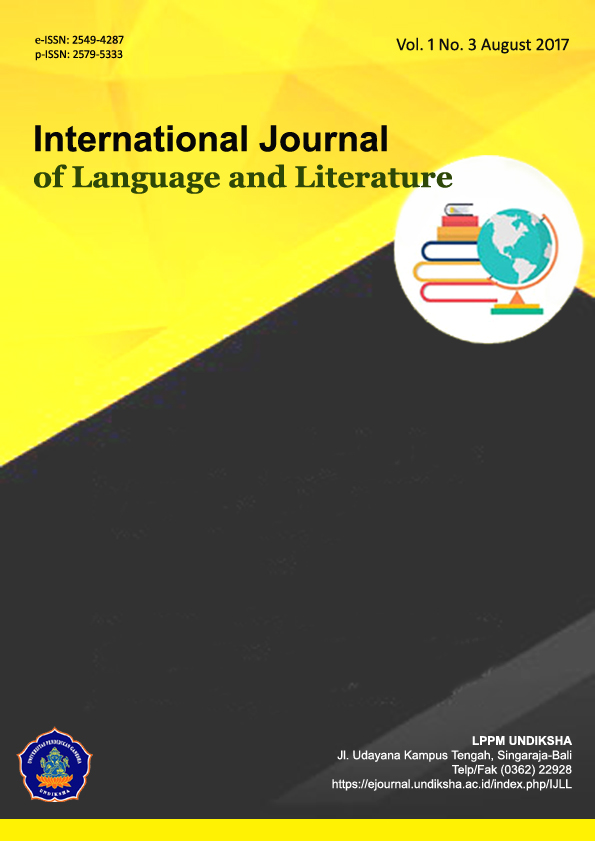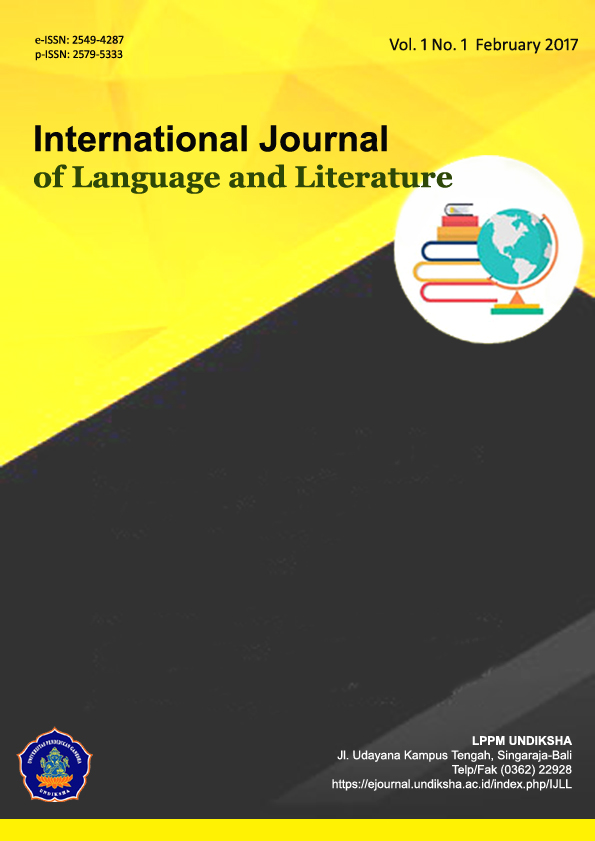AN EXPERIMENTAL STUDY ON THE EFFECT OF PARTS STRATEGY AND ANXIETY ON READING COMPETENCY AT THE ELEVENTH GRADE STUDENTS OF SMAN 5 DENPASAR
DOI:
https://doi.org/10.23887/ijll.v1i3.12548Kata Kunci:
PARTS Strategy, Anxiety, Reading CompetencyAbstrak
The aim of this study was to prove whether the implementation of PARTS Strategy and the students’ anxiety gave a significant effect to the students’ reading competency. The study was an experimental study by applying Post test only control group design. The population was nine classes (420 students) of grade XI in SMA Negeri 5 Denpasar academic year 2012/2013, in which 2 classes were samples which were assigned into two groups, i.e. experimental group and control group, by a Multi-Stage Random Sampling. The research data were collected through questionnaire and test that were analyzed using Statistical Two-Way Anova. The results show that, first, there was different effect in reading competency between the students who were taught by implementing PARTS strategy and those who were taught by implementing Conventional reading startegy (Sig.=0.004 <=0.05). Secondly, there was not interactional effect of PARTS strategy and anxiety level upon the students’ reading competency at the eleventh grade students of SMA negeri 5 Denpasar (Sig.=0.966 >=0.05). In view of the results of this study, it is therefore suggested that teachers should use PARTS Strategy as an innovative teaching strategy since the facilitation of this strategy significantly improved the students’ reading competency.
Referensi
Abu-Rabia, S. (2004). Teachers’ role, learners’ gender differences, and FL anxiety Among seventh-grade students studying English as a FL. Educational Psychology, 24(5), 711-721
Chang, Anna.2010. Journal : The Effect of a Timed Reading Activity on EFL Learners : speed, Comprehension, and Perceptions. Available at www.nflcr.hawaii.edu/rfl/October2010/article/chang.pdf.22 Accessed on 1st October 2012
Fraenkel, J.R., & Wallen, N.E. (2006). How to design and evaluate research in education (6th ed.). New York: McGraw-Hill, Inc
Juniari.2005. The application of PARTS strategy to improve the Achievement of The Second Year students in Comprehending Reading Text. (A Classroom Action-Based Research Conducted at the class of Social Science 1 of SMA Negeri 4 Singaraja in the Academic year 2005/2006). Unpublished Thesis. Universitas Pendidikan Ganesha Singaraja
Marhaeni, A.A.I.N. 2007. Determinasi Beberapa Faktor Affektif yang Mempengaruhi Keberhasilan Belajar Mahasiswa Jurusan pendidikan Bahasa Inggris Universitas Pendidikan Ganesha. Unpublished Research Grand Report:Undiksha
Martin, Alex. 2007. Handling Writing Anxiety. At http://www.termpaperscorner.com/Articles/writing_Anxiety.html. Accessed on May 3rd 2013.
Mayers, Chet.1986.Teaching Students to Think Critically. Jossey-Bass Publisher.San Fransisco-London
Na, Z. (2007). A study of high school students’ English learning anxiety. Asian EFLJournal, 9(3), 22-34
Newstead, Karen. 2004. Aspects of Children’s Mathematics Anxiety. Journal of Educational Studies in Mathematics, Volume 30, Issue 1, Page 53-71
Seligman, L.D. & Wuyek, L.A. (2007). Correlates of Separation Anxiety Symptoms Among First- Semester College Students: An Exploratory Study. The Journal of Psychology. 141(2): 135-146
Suzanne, Graham. 2000. Effective language learning: Positive Strategies for Advanced Level Language. University of Oxford
Vogel, H. & Collins, A. (2006). The relationship between test anxiety and academic performance.Journal of Abnormal and Social Psychology. 67: 523-532
Williams, Christina.2010. Comprehension Important Reading. Available at http://www.ehow.com/facts_5146900_comprehension-important-reading.html. Accessed on 1st October 2012
Waseso, M.G. 2001. Isi dan Format Jurnal Ilmiah. Makalah disajikan dalam Seminar Lokakarya Penulisan artikel dan Pengelolaan jurnal Ilmiah, Universitas Lambungmangkurat, 9-11Agustus
Zeidner. 1998. Testing situation in Test Anxiety. At http://www. Iml.uts.edu.au/assessment/students/performance.html. accessed on May 3rd 2013
Unduhan
Diterbitkan
Cara Mengutip
Terbitan
Bagian
Lisensi
IJLL Journal provides immediate open access to its content on the principle that making research freely available to the public to supports a greater global exchange of knowledge.

This work is licensed under a Creative Commons Attribution-ShareAlike 4.0 International License








